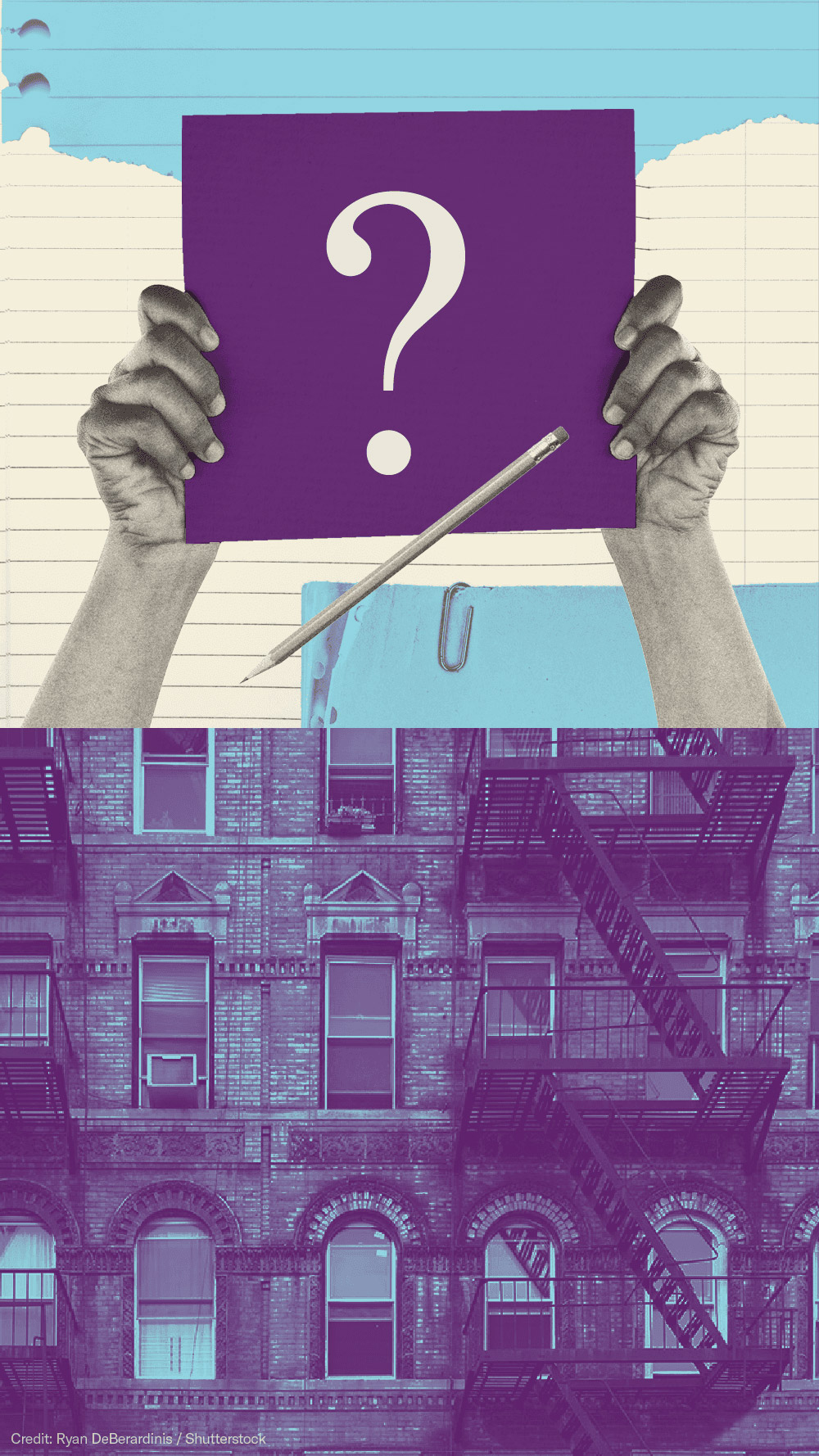Back to
News & Commentary
Quiz: What You Need to Know About Fair Housing


Housing discrimination is still rampant around the country — take our quiz on how it has been perpetuated over the years and what we’re doing to fight back.
Housing discrimination is still rampant around the country — take our quiz on how it has been perpetuated over the years and what we’re doing to fight back.
Access to housing is a right that should be equally accessible to everyone in the country — but this is sadly far from reality. Although federal protections have been established to eliminate bias-driven hurdles, many practices still exist today that make it harder for Black people and other people of color, women, LGBTQ people, people with disabilities, and many others to access stable housing.
To create a more just society in which everyone’s civil rights are recognized, we must work to end discriminatory housing policies and practices. Test your knowledge and learn more about how the ACLU is advocating to ensure access to housing for all by taking our quiz.
Learn More About the Issues on This Page
Related Content
-
Press ReleaseFeb 2025

Racial Justice
Human Rights
New Report Finds Nevada’s Lithium Mine Permit Violates Indigenous Peoples’ RightsNew Report Finds Nevada’s Lithium Mine Permit Violates Indigenous Peoples’ Rights
WASHINGTON — The U.S. government’s decision to permit Lithium Americas to mine at Thacker Pass in Nevada violated Indigenous people’s rights, Human Rights Watch and the American Civil Liberties Union said in a report released today. The nearly 18,000 acre mine is under construction and will extract lithium from one of the world’s largest known deposits. Researchers found in the 133-page report, “The Land of Our People, Forever,” that the Bureau of Land Management, the government agency responsible for managing federal land, permitted the Thacker Pass mine in northern Nevada without obtaining the free, prior, and informed consent of Indigenous people. The Numu/Nuwu and Newe, or northern Paiute and western Shoshone in English, experienced violations of their rights to religion, culture, and to their ancestral lands under international human rights law and standards. While there may be others, at least six tribes have connections to the land at Thacker Pass. “Obtaining the minerals necessary for an urgent phaseout of fossil fuels should include protection for the rights of Indigenous peoples,” said Abbey Koenning-Rutherford, Aryeh Neier fellow with the American Civil Liberties Union and Human Rights Watch. “U.S. federal and state mining agencies should urgently review the regulations governing mine permits to bring them in line with international standards on Indigenous peoples’ right to free, prior, and informed consent.” Between September 2023 and January 2025, Human Rights Watch and the ACLU interviewed 41 Indigenous community members, journalists, lawyers, and experts about the impact of the mine. Researchers also reviewed litigation, scientific studies, news and social media, satellite imagery, and environmental maps. Lithium is a mineral used in the batteries for electric cars and other renewable energy technologies that are considered critical for phasing out fossil fuels and mitigating climate change. But in October 2024, a United Nations panel stated that “urgency of the energy transition cannot justify irresponsible practices in mining” and said that governments should uphold the rights of Indigenous peoples. The Bureau of Land Management approved the mine on Jan. 15, 2021, claiming contact with tribes, but its direct outreach was limited to three rounds of mailings to three Tribal governments. Lithium Americas and General Motors, the companies developing the mine, moved forward despite opposition from at least five Tribal governments, Human Rights Watch and the ACLU found. U.S. courts rebuffed tribes’ efforts to challenge the adequacy of the consultation process after the agency had issued the permit. One, the Fort McDermitt Paiute-Shoshone Tribe, has since signed an agreement with Lithium Americas and issued a letter supporting the mine. The construction work has prevented Numu/Nuwu and Newe Indigenous peoples from accessing parts of Peehee Mu’huh, the Indigenous name for land in the area. Tribal residents also expressed fears that the mine threatens their rights to health, a healthy environment, and water. The land around Thacker Pass is particularly significant as it includes areas where people fled and died during an 1865 U.S. cavalry massacre. Tribal members pay tribute to their ancestors, annually commemorate the massacre, and engage in other religious practices on the land. “Bands of northern Paiutes, western Shoshones and Bannocks have a history with the United States Government,” said Gary Mckinney, spokesperson for People of Red Mountain, an Indigenous rights organization. “That history includes mining, broken treaties, and Indian reservations which were established to assist in unwarranted land degradation caused by mining and livestock grazing on ancestral Paiute, Shoshone and Bannock hunting and gathering landscapes.” U.S. law provides Indigenous peoples with little protection of their ancestral land rights outside of reservations. The outdated 1872 mining law gives U.S. citizens, including companies, the ability to claim mineral rights on most federally owned land, the vast majority of which was confiscated from Indigenous peoples. The Thacker Pass mine permit was set in motion in part by this 1872 law. “The Thacker Pass mine stands as a warning of the risks Indigenous peoples face unless mining for lithium and other minerals is done responsibly and in a rights-respecting manner,” added Koenning-Rutherford. “The United States should respect Indigenous peoples’ centuries-long connections to Peehee Mu’huh and act to prevent further harm at Thacker Pass.” The report outlines tangible steps the U.S. government can take to respect the rights of Indigenous tribes, including: Halt construction at Thacker Pass until it has obtained the free, prior, and informed consent of all impacted tribes Ensure that all current and future mine permit processes comply with international human rights standards Build on the recommendations of a 2023 interagency working group by reforming the 1872 mining law to bring it into compliance with international human rights law, especially the rights of Indigenous peoples -
News & CommentaryJan 2025

Racial Justice
Trump’s Executive Orders Rolling Back DEI and Accessibility Efforts, ExplainedTrump’s Executive Orders Rolling Back DEI and Accessibility Efforts, Explained
These orders represent a deliberate attempt to undo progress on diversity, equity, inclusion, and accessibility and create new barriers to opportunity.By: ReNika Moore -
Press ReleaseDec 2024

Racial Justice
ACLU Statement on House AI Task Force ReportACLU Statement on House AI Task Force Report
WASHINGTON — Today, the House Task Force on Artificial Intelligence (AI) issued its final report, marking an important step in recognizing the serious risks of discrimination and bias posed by AI systems — particularly in law enforcement’s use of facial recognition technology. The report recognizes that discrimination and bias may arise in AI systems due to their design, training data, or failures by end users. The report also investigates the complex considerations around deepfakes, open AI systems, and free speech, and urges Congress to pass narrow legislation to address concrete harms. In response to the House AI Task Force final report, Cody Venzke, senior policy counsel at the American Civil Liberties Union, issued the following statement: “The ACLU commends the Task Force for recognizing that AI systems are harming people right now through discriminatory outcomes and supercharged surveillance. Curbing those abuses of AI is not a partisan issue, and more concrete action is needed to protect civil rights, while maintaining states’ authority to build on those protections. The Task Force is appropriately cautious when wrestling with issues around deepfakes, open-source AI, digital identity, and other issues, recognizing that legislators should consider a wide array of tailored tools to address real, not speculative, harms while respecting civil rights and civil liberties.” The House Task Force on Artificial Intelligence report can be found here. -
News & CommentaryDec 2024

Racial Justice
Human Rights
Why the Fight for Racial Justice is a Human Rights IssueWhy the Fight for Racial Justice is a Human Rights Issue
On International Human Rights Day, the ACLU is advocating for a long-sought after reparatory justice to end the continued abuses against Black and brown communities.By: Alaina Ruffin